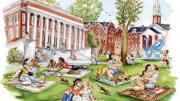1911 Because more seniors wish to room in the Yard, the Corporation is likely to furnish the south entry of Thayer Hall with steam heat and baths, already available in the rest of the building.
1916 The Board of Overseers agrees to extend the right to vote in Overseer elections to all Harvard degree holders, including those from the professional schools.
1921 The Medical School will offer a new degree, doctor of medical sciences, in an effort to attract those interested in the scientific, rather than the clinical, aspects of medicine.
1931 The Harvard Faculty Club begins operations, with separate entrances, lounges, and dining rooms for men and women. …The Corporation declines a bequest from a Boston lawyer of $25,000 for a lectureship designed to prove that the “modern feminist movement… [impairs] the family as a basis of civilization and its advance….”
1936 The master of Lowell House invites the parents of House residents to spend several days there during spring recess to see how their sons live.
1946 Enrollment in the College, which dropped to 671 during the war, is expected to pass 3,000 for spring semester.
1951 A survey of Bulletin readers finds that only one in four subscribers owns a television set.
1956 The College announces an increase in tuition from $800 to $1,000.
1966 The Cambridge city council approves Harvard’s request to construct, at its own expense, a six-lane underpass at the western end of Cambridge Street, north of the Yard.
1971 The movie Love Story brings to the screen the best-selling novel by Erich Segal ’58, but leaves the Bulletin’s reviewer seriously underwhelmed.
1976 In an effort to save as much as $150,000 in fuel costs, the University extends winter recess to three weeks, pushing the start of exams back to January 23.






